Tosh Berman's Blog, page 99
March 25, 2021
Johnnie Ray - "Soliloquy of a Fool" 45 rpm single, 1957 (Columbia)
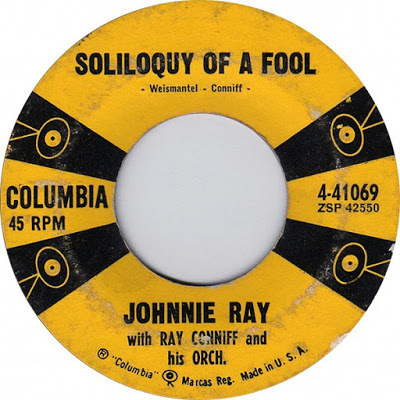
Johnnie Ray is one of my favorite figures in 20th-century pop music. He's the bridge between icon Frank Sinatra and icon Elvis. Visually I love his hair, and even more important, he would wear a bulky hearing aid on stage for one of his ears. Vulnerable, handsome, and intense. Ray can convey misery and loneliness like no other being. There is something alien about him, probably why David Bowie wanted to play him on the big screen. Johnnie Ray has done many magnificent recordings, but nothing as brilliant and special as "Soliloquy of a Fool."
It's a song of regret and sorrow, but what makes it unusual is the music's production and arrangement. It is credited to Ray Conniff and his Orchestra, which means 'middle-of-the-road' arrangements typically. The instrumentation is basically Johnnie's echo-laden voice, a minimal electric organ, and some electronic or heavy echo percussion that is even more minimal. It's an extraordinary record as well as being truly beautiful.
I'm dying to know the history of this song, but especially the recording. Conniff co-wrote the song, and I'm guessing he wrote the music. I suspect that it wasn't a hit, and in fact, it's the b-side of the single, with the A-side being "Miss Me Just A Little." Nevertheless, a small but stunning masterpiece.
Wallace Berman Retrospective Catalog 1978
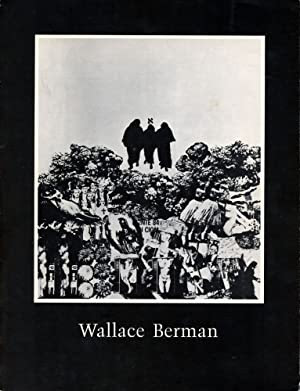
As far as I know this is the first full catalog of Wallace Berman's art. It was published by the Fellows of Contemporary Art in 1978. Two years after my dad's death. The exhibiton was curated by Hal Glicksman and located at Otis Art Institute in Los Angeles. Walter Hopps was originally going to curate the show, but he disappeared and I can't remember why. I do have a memory having a meeting with Walter at a big table at someone's house. I was there with my mom, I'm pretty sure Hal was there as well. Walter spoke slowly with a sense of drama. He said "Wallace's art is.....on the wall....and the walls are white....." We all silently thought about this, and we all nod our heads yes. Nevertheless, Hal did a remarkable job in putting the show together, and it looked beautiful.
"Wallace Berman Retrospective" (1978) is out-of-print and be expensive when found. But for the collector..... "Perfect bound in wrappers, 118 pp., illustrated throughout. Includes a foreword by Hal Glicksman, an interview with Walter Hopps, essays by Robert Duncan and David Meltzer, a chronology, a catalog of the exhibition, and a bibliography. An important early gathering of Berman's work, his first retrospective."-Tosh Berman
March 23, 2021
The Tokyo Boys - "Midnight in Tokyo" MGM Records, 1963
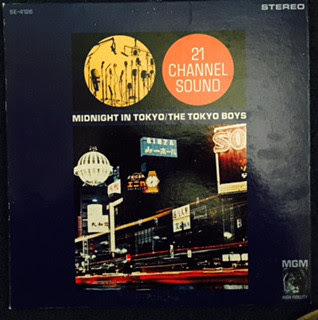
Middle-aged male jet setters in 1963 would fly to Tokyo for business and, of course, pleasure. With their business accounts, they can stay at 5-star hotels such as The Prince or The Imperial and go to the small but exclusive bars in the Ginza. These bars would have hostesses where they pour your drinks and laugh at your dirty jokes. "Midnight in Tokyo," recorded in Tokyo and in 1963, is the soundtrack to that type of life.
When I first started to go to Tokyo in 1989, there were traces of the 1963 lifestyle. Still orientated to the Japanese salarymen who have expense accounts through their company or visiting businessmen from America and Europe. That world still exists, but the outside world is much bigger now. Still, there is a romantic feeling for the decade of beautifully neon-lighted streets in the Ginza. It's still there, but more of a shopping experience as well as a location for refined dining and drinking pleasures.
The Tokyo Boys made only one album, and it is this piece of exotica. Mostly big band instrumentation but filtered through various Japanese or Asian melodies. There's the Latin rumba, but with touches of the orient. For me, the album reminds me of the soundtrack to a lot of the 60s Yakuza films. I'm not sure if there is an original Tokyo Boys album release in Japan. Still, MGM records made this album as part of their "21 Channel Sound" series. The technique is that they used 21 microphones in the studio, a big thing in 1963. Of course, it's well-recorded, but the purpose here is to transport the listener to another world. One where they can enjoy the fruits of labor, work, and the all-night drinking session with one's fellow office workers.
Martin Denny took the listener to Hawaii or other ports of "exotica," but here in "Midnight in Tokyo" is a destination to one getting lost in Japanese elegance. It's a myth, but when you are a broke listener in one's studio apartment, this is the world of escape pleasures.
March 22, 2021
"The Emotional, Cosmic & Occult World of Joe Meek" - V.A. (Mississippi Records)
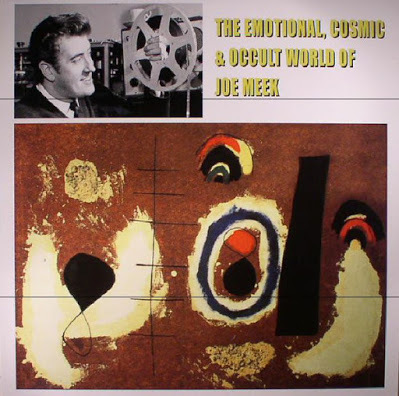
There are many compilations of Joe Meek's recordings or productions, especially in the CD format. Still, on vinyl, this album is my favorite of the lot. It's not extensive but put together with great taste and intelligence. I suspect that this is a bootleg, so I'm not sure if the editing of this compilation was one because they had no choice, or by design, an excellent representation of Joe Meek's music.
"The Emotional, Cosmic & Occult World of Joe Meek" (great title, by the way) covers a lot of ground within its 12 cuts. The most well-known 'hit' song here is John Leyton's classic "Johnny Remember Me." The others are obscure to everyone except for the hardcore Meek fan. The album opens up with The Blue Rondos' "Little Baby," in which Ricky Nelson meets Roy Orbison and is a great song/recording. The drums' thump-thump sound is here, which is very much a Meek trademark, but also the echo on the vocalist's voice, which sounds like it is coming from a world beyond us. It's eerie, beautiful, and sexy.
Speaking of thump-thump drums, we have The Outlaws' "Crazy Drums," a fantastic percussion workout edited by Meek and played by Meek's guitar great Ritchie Blackmore. The Moontrrekkers' "Night of the Vampire" has a galloping beat with horror sound effects. One of the remarkable instrumentals that seem so right and is the definition of perfection at work. Meek worked a lot with Glenda Collins, and here we have a great tune, "It's Hard To Believe It," that confronts the optimism of the space age in the early 1960s. There are also two songs from the Meek masterpiece "I Hear A New World," The Blue Men's "The Bublight" and "Valley of the Saros." On one level, it is kitsch, but Meek took space travel, aliens, and the after-life very seriously. For one who wants to put one foot forward into the Joe Meek world, I strongly recommend "The Emotional, Cosmic & Occult World of Joe Meek."
Russ Meyer's Birthday
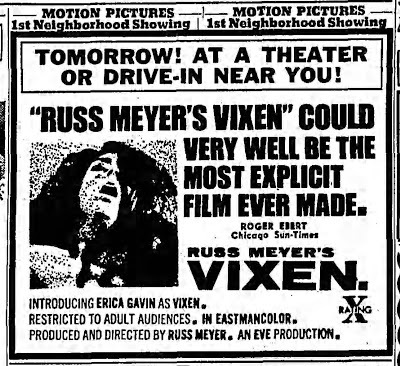
It was sex/filmmaker Russ Meyer's birthday a few days ago, or maybe yesterday? What a remarkable film artist. I remember going to see a film retrospective on Hollywood Blvd and being transported to an extraordinary world. Only two filmmakers affected me in that sense. The other director was Fassbinder. Both are obsessed geniuses who transform their landscape into a private space that becomes public. For me, there is nothing sexy about Meyer's work. It's about sex without the sexy feeling, which is very odd. Also, since he's the cinematographer and director/writer, one enters a place with its own sense of rhythm and rhyme. Meyer is a unique artist. Exploitation is his soul, and the crisp black and white images of his early films are a wonder in itself. But also in his color films how blue the sky is. Nature, tits, ass, and Russ Meyer.
March 21, 2021
Jefferson Airplane "Volunteers" 1969 (RCA)
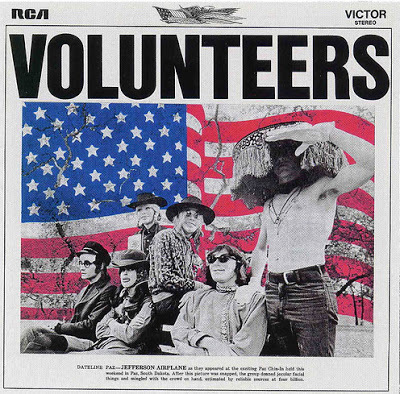
I like it but don't love Jefferson Airplane. I'm very fond of vital voices within the band, mostly Marty Balin with a side dish of Grace Slick. Their 1969 album, "Volunteers," is the Hippie Revolution's height, and I like it for that reason. Although I do have to say that there is also another voice on this album that I adore. It's Nicky Hopkins piano playing throughout the record. It's an interesting road that leads Nicky from being the piano player of the British Invasion to the heart of the San Francisco Hippie scene. His playing is lyrical, and at times I just listen to his keyboard work and not listen to the rest of the music. Which is an odd thing to do, but the joy of hearing the piano among the guitars, drums, and voices is really the essential part of the music.
"Hey Fredrick" is Grace magic. Her voice soars, the guitars (Paul Kanter and especially Kaukonen) twang with intensity, jazzy bass by Jack Cassidy, and Nicky's piano underpin the music as like adding salted butter to a slice of warm french bread. Eight minutes or so of bliss. The great thing about the Airplane is that they have the folk music aesthetic as a foundation, but it can lead to free-form jazzy rock with no fear of falling off the ledge. So yes, I don't love everything they do, but when they hit the spot, it's a bullseye.
Signed TOSH copies at Artbook @ Hauser & Wirth Los Angeles
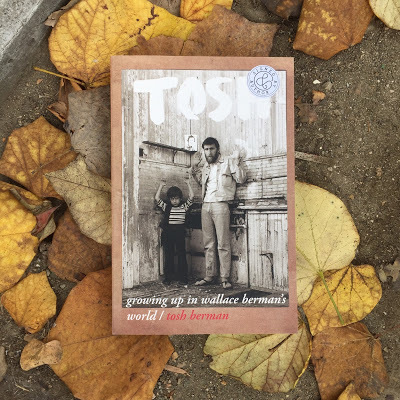
The good news is Artbook @ Hauser & Wirth is open to the public. The other good news is that they have signed copies of my book TOSH: Growing Up in Wallace Berman's World" in stock as well as my other books "Sparks-Tastic" and the book of poems "The Plum in Mr. Blum's Pudding" The store's hours are 11 to 6 PM.
Phone Number: (213) 988-7413
Joe Meek - I Hear a New World [Full Album]
I discovered Joe Meek in Tokyo about 30 years ago. I found this fantastic compilation of his recordings, but the 'odd' masterpiece without a doubt is his own album "I Hear A New World." I believe the album was made in 1959, and yes, on one level it's kitsch. But if you look at it on the level of someone who was obsessed with space travel, aliens from outer space, the after-life, and early electronics this album is amazing. Meek made the studio as an instrument. Without a doubt, he was a troubled genius. He's featured in the book "The Velvet Mafia," which we go in detail on our show BOOK MUSIK. Here's the full album of "I Hear A New World" Joe Meek's "I Hear A New World"And here is our podcast Book Musik where we discuss Meek and The Velvet Mafia with the author Darryl W. Bullock. Book Musik: The Velvet Mafia
March 20, 2021
PAUL JONES - COME INTO MY MUSIC BOX, 1969 (COLUMBIA)
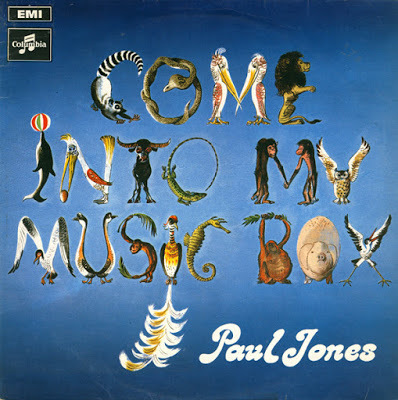
PAUL JONES - COME INTO MY MUSIC BOX, 1969 (COLUMBIA)
There are so many great singers from the British Invasion era, but my favorite voice from those times is Paul Jones. Brian Jones had the good taste to think of Paul being the vocalist before approaching Mick Jagger for the Rolling Stones. Instead, Paul Jones ended up being the lead singer in the band, Manfred Mann. His work with that band is exceptional. The Manns were unique because they were basically Jazz musicians who did pop but thought out their arrangements in the school of jazz or rhythm n' blues. They did the best cover versions of Bob Dylan's music as well. The band could be crass in their commercial taste, but always with the sophistication of a master musician. At the height of the swinging 60s, Jones left Manfred Mann to become an actor and solo artist. Although his solo career has its peaks and lows, the one thing that never failed him was his voice. He can sing the alphabet, and he would bring out the complexities of joy, despair, and love within the letters. If one has to choose his best solo work, it would be 1969's "Come Into My Music Box."
The album title is a very descriptive approach to the music on this record. We have everything from "Aquarius" (from the ultimate 60s musical "Hair") to The Band's "The Weight." It is like Jones wanted to express all his love on one LP. The album, in a manner, is a compilation, due that are five separate producers (John Burgess Norman Newell, Peter Asher, Mort Shuman, and Paul Jones), including Tony Visconti making the arrangement and conducting on the song "Pick Up In The Morning." Listening to this 52-year old album, it is clearly a record to define the end of the 1960s.
Paul Jones's solo either had a blues obsession, but he can also portray himself as a West End musical singer. "I'm Here To Nudge Your Mind" and "Aquarius" come off as a groovy version of the mainstream world of theater. There are traces of early Bowie, which suggests that David followed Paul Jones's presence in the pop world. By chance or design, Paul covers my two favorite songs from the 60s. Donovan's "Celeste" and Procol Harum's "Homburg." "Celeste" suits Jones's voice, and he does take a Donovan baroque Folkie song into a theatrical song piece. "Hamburg" in Paul's world becomes a baroque psychedelic pop masterpiece. Using filters on the vocals can be seen as overkill. Still, it is powerfully effective when it kicks into his voice with echo.
"Come Into My Music Box" is very much a variety show set on the LP format. It's a series of puzzles that fits perfectly together. In theory, this could have been a disaster. Still, the choice of songs and the genius of Paul Jones's approach to his material is a superb listening experience.



